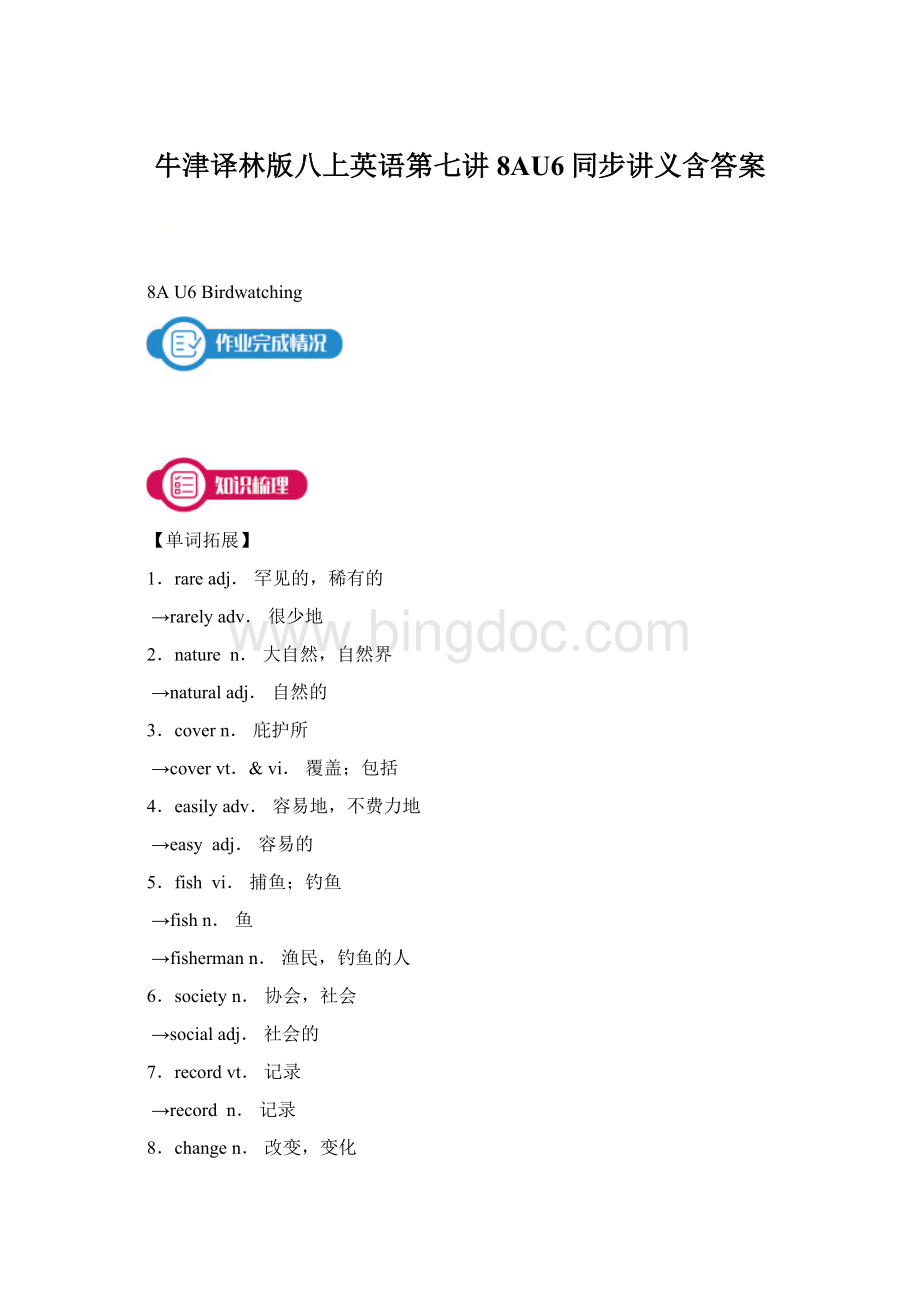牛津译林版八上英语第七讲8AU6同步讲义含答案.docx
《牛津译林版八上英语第七讲8AU6同步讲义含答案.docx》由会员分享,可在线阅读,更多相关《牛津译林版八上英语第七讲8AU6同步讲义含答案.docx(9页珍藏版)》请在冰点文库上搜索。

牛津译林版八上英语第七讲8AU6同步讲义含答案
8AU6Birdwatching
【单词拓展】
1.rareadj.罕见的,稀有的
→rarelyadv.很少地
2.naturen.大自然,自然界
→naturaladj.自然的
3.covern.庇护所
→covervt.&vi.覆盖;包括
4.easilyadv.容易地,不费力地
→easyadj.容易的
5.fishvi.捕鱼;钓鱼
→fishn.鱼
→fishermann.渔民,钓鱼的人
6.societyn.协会,社会
→socialadj.社会的
7.recordvt.记录
→recordn.记录
8.changen.改变,变化
→changevt.&vi.改变
9.touristn.旅行者,观光者
→tourvt.&vi.旅行,旅游
→tourn.旅行
10.importancen.重要性
→importantadj.重要的
11.clearlyadv.清晰地
→clearadj.清楚的,清澈的
→clearvt.清除
12.speakern.说话人;演讲者
→speakvt.&vi.说话,讲话
13.applicationn.申请
→applyvt.&vi.申请
【短语归纳】
1.atthemarket.在市场上
2.oneoftheworld’Smostimportantwetlands.世界上最重要的湿地之一
3.providefoodandcoverforalotofwildlife.为许多野生生物提供食物和栖息地
4.allyearround一年到头
5.40percentofthem它们中的40%
6.forashortstay作短暂停留
7.1essandlessspace越来越少的空间
8.understandtheimportanceofthewetlands明白湿地的重要性
9.wearapairofcomfortableshoes穿一双舒适的鞋
10.coveranareaof4530squarekilometers占地4,530平方公里
11.takeanotebookwithsb随身带好笔记本
12.makebeautifulsounds发出美妙的声音
13.jointheBirdwatchingSociety加入观鸟协会
14.introduceoneself自我介绍
15.beinterestedindoingsth.对做某事感兴趣
16.becomeamemberoftheBirdwatchingSociety成为观鸟协会的一员
17.takepartinactivities参加活动
18.hearsomeonesinginthepark听见有人在公园里唱歌
19.partofourlives我们生命的一部分
【句型分析】
1.Whatdocraneslooklike?
(P69)
句意:
鹤长什么样子?
此句话用了句式:
Whatdo/doeslooksb.1ike?
意为“某人长什么样子?
”,常用来询问某人的外貌特征。
而句式What’ssb.1ike?
意为“某人长相、性格如何?
”,常用来询问某人的外貌特征或个性、品质。
如:
一whatdoesMaylooklike?
梅长什么样?
—Sheissmall,andhasshorthair.她长得小小的。
留着短发。
一Whatisyourmotherlike?
你母亲是怎样的一个人?
一She’skindandbeautiful.她善良而且漂亮。
2.Therearenotmanycranesleftintheworld,and40percentofthemliveinZhalong.(P70)
句意:
世界上的鹤所剩不多,其中40%生活在扎龙。
句中用了固定句式therebesb./sth.1eft,意为“还剩下……人或物”。
如:
Thereisnothingleftintheroom.屋子里什么都没剩下。
Therewasalittlemoneyleftinmypocket.我口袋里只剩下一点钱。
句中的percent是名词,意为“百分之……”。
百分比与不可数名词连用作主语时,谓语动词一般为单数形式;与复数名词连用作主语时,谓语动词用复数形式。
如:
Ninetypercentofthewaterwaspolluted.百分之九十的水被污染。
Sixty-fivepercentofthechildrenlikefastfood.百分之六十五的孩子喜欢快餐食品。
3.Somepeoplewanttomakethewetlandssmallerinordertohavemorespaceforfarmsandbuildings.(P70)
句意:
一些人想减少湿地,以便为开垦农场和建造楼房腾出更多的空地。
句中的makethewetlandssmaller意为“使湿地变得更小”,用了“makesb./sth.+形容词”结构,意为“使某人或某物……”如:
Weallhopetomaketheactivityinteresting.我们都希望使这次活动变得有趣。
OurteachertriestomakeusinterestedinEnglish.我们的老师尽量使我们对英语感兴趣。
另外,句中的inorderto意为“以便;为了”,后接动词原形构成inordertodosth.表示“为了做某事”·强调目的。
有时为了加强语气,可把inorderto置于句首。
如:
Wewanttogetthereearlyinordertoseethesunrise.我们想早点儿到那儿看日出。
InordertogettherebeforeeightIstartedearly.为了在八点以前赶到那里,我很早就动身了。
4.Shesawababypandadrinkhermother’Smilk.(P74)
句意:
她看见一只熊猫宝宝喝母乳。
句中用了结构seesb.dosth.,意为“看见某人做过某事”.一般强调看见某人做某事的过程.而seesb.doingsth.表示“看见某人正做某事”.强调看见的时候,某动作正在进行。
如:
Isawhimworkinthegardenyesterday.昨天我看见他在花园里干活了。
(强调“我看见了”这个事实)
Theyknewherverywell.Theyhadseenhergrowupfromchildhood.
他们很了解她,从孩童时起他们就看着她长大。
(强调成长的过程)
Isawhimwalkinginthestreet.我看见他正在街上散步。
(强调动作正在进行)
5.Whatelseshouldwetake?
(P76)
句意:
我们应该带点其他什么吗?
句中的else是副词,意为“其他,另外”,常用来修饰疑问代词(who,whose,what等)或疑问副词(why,when,where,how),以及any-,every-,some-,no-与-body,-one,-thing,-where合成的复合不定代词。
当else修饰疑问词或不定代词时,else应置于其后作后置定语。
如:
Whatelsedoyouhaveonthemenu?
你们的菜单上还有别的什么吗?
Whatelsedidhesay?
他还说了别的什么?
Idon’twantanythingelse,thanks.我不要别的东西了,谢谢。
Doyouhaveanythingelsetosay?
你还有别的什么要说的吗?
Isanyoneelsecomingtotheparty?
还有其他人来参加这个聚会吗
【语法点拨】
动词不定式作目的状语
1.动词不定式作目的状语主要用来修饰动词,表示某一动作或状态的目的。
为了使目的意义更加清楚或表示强调意义时,还可以在动词前面加inorderto或soasto,意为“为了,目的是”。
如:
Hestoppedtoasktheway.他停下来问路。
Iwillsitinthefrontinordertohearmoreclearly.为了听得更清楚,我要坐在前面。
2.动词不定式的否定形式是在to前加not。
如:
Iwroteitdowninordernottoforget.为了不忘记,我把它写了下来。
3.由inorderto引导的目的状语,既可以置于句首,也可以置于句尾,而由soasto引导的目的状语,只能置于句尾,不能置于句首。
如:
Theystartedearlyinorderto/soastogetthereintime.
为了及时赶到那里,他们很早就出发了。
一Inordertogetthereintime,theystartedearly.
4.动词不定式的复合结构作目的状语
当不定式有自己的主语时,要用不定式的复合结构(即在不定式前加for+.g词或代词宾格)作状语。
如:
Heopenedthedoorforthechildrentocomein.
为了让孩子们进来,他打开了门。
动词不定式作宾语补足语
动词不定式充当宾语补足语时,表示的是宾语所发出的动作,或用来表示宾语的状态、特性、身份等。
构成“动词+宾语+不定式”,主要有以下几种:
1.动词+宾语+todo,否定形式为:
动词+宾语+nottodo。
这类动词主要有want、wish、ask、tell、advise、allow.encourage,invite,need,order,warn,like,hate,teach、expect、get等。
如:
Myteachertoldustowearschooluniforms.老师叫我们穿校服。
Pleaseaskthemnottomakenoise.请叫他们别吵了。
2.感官动词和使役动词后跟不带to的不定式作宾补。
这类动词有:
感官动词hear、feel、see、watch、notice等;使役动词let、make、have。
如:
Isawheropenthedoor.我看见她开了门。
Youcanlettheboygofirst.你可以让那个男孩先走。
3.动词help后面的动词不定式可带to,也可不带to。
如:
Ioftenhelpmymother(to)dohousework.我经常帮母亲做家务。
基础演练
1.Shewenttothemarket___________thebirds.
A.watchB.towatchC.watchingD.watched
2.___________failthefinalexam,hestudiesEnglishdayandnight.
A.InordertoB.SoastoC.InordernottoD.Soasnotto
3.Marycalledandaskedherhusband___________homeatonce,becauseshelockedtheirdaughterinthehome.
A.toleaveB.leaveC.goD.togo
4.Let’s_________forawalk,shallwe?
A.togoB.goingC.goD.gone
5.Ourteacheroftentellsus_________intheriver.It’sdangerous.
A.don’tswimB.notswimC.nottoswimD.notswimming
答案:
BCDCC
巩固提高
Doyouknowhowtomakefriendswithagroupofpeople?
Letmet_____1_____youthestepsaboutmakingfriendswiththegroup.Maybeit’sh_____2_____toyou.
First,youneedtoknowwhatk____3____ofgrouptheybelongto.Ifpeopleofthegroupareshy(害羞的),neveraskthem“Whydon’tyoutalk?
”or“Whyareyouquiet?
”Theydon’tlikeit,sod_____4____doit.
N___5____,rememberthateachgroupisdifferent.Theywillusedifferentwords,finddifferentthingsfunny.
Then,theimportantthingisthatyoushouldtrytobeoutgoing(外向的).I___6___youareoutgoing,youwillbecomeverypopular.Remember,n____7____wantstomakefriendswithaquiteshyperson.
F___8____,findarighttopictotalkwiththegroup.Forexample,youcanaskpeoplew___9____theywilldobeforetheweekend,butdon’tmakeplansatonce.S___10_____thingscanchange,sojusttalkwiththem.
1.___________2.__________3.__________4.____________5.__________
6.___________7.__________8.___________9.___________10.__________
答案:
1.tell2.helpful3.kind4.don’t5.Next
6.If7.nobody8.Finally9.what10.Some/Sometimes
单项选择
()1.Johnis_____honestboy.Everyoneinourclasslikesmaking______friendswithhim.
A.a,theB.a;/C.an;theD.an;/
()2.–What’stheAmericanEnglishfor“autumn”?
–__________.
A.EraserB.MovieC.FallD.Vacation
()3.Thetripfromtheschool________abouttwohoursbycoach.Itwastoo_________.
A.spent,boringB.took,boringC.cost,boredD.took,bored
()4.Thetravellershavetripsfromoneplaceto_________allovertheworld.
A.theotherB.otherC.theothersD.another
()5.Parents______goodconditions(条件)_______us.Weshouldbegrateful(感激的)tothem.
A.provide,toB.provide,forC.protect,toD.protect,for
()6.Japanis__________theeastofChinaand__________theeastofAsia.
A.in,inB.in,toC.to,inD.to,to
()7.Mymother_________metothezooifshe________freetomorrow.
A.willtake,willbeB.takes,isC.willtake,isD.takes,willbe
()8.–Amy,Iboughtadressmade_____silkyesterday.
–Wow,itlookslovely_______you.
A.of,onB.from,onC.of,forD.from,for
()9.–I’mafraidIcan’tgotothepartytomorrow.
–________youtoldmeyouwould.Whathappened?
A.AndB.ButC.SoD.Or
()10.Thereare________booksinourschoollibrary.Thestudentsliketoreadthemverymuch.
A.fivethousandsofB.fivethousandsC.fivethousandD.thousandof
()11.Hermotherlooked_________atthatmomentwhensheheardthegoodnews.
A.happyB.happilyC.unhappyD.unhappily
()12.________ofgiantpandasisgetting_________becausetheirlivingareasarebecomingfarmland.
A.Thenumber,largerandlargerB.Anumber,largerandlarger
C.Thenumber,smallerandsmallerD.Anumber,smallerandsmaller
()13.Youare_____tochoosetheway_______thetask.
A.free,finishingB.free,finishC.free,tofinishD.freely,tofinish
()14.—ShallwegotoLaosheTeaHousetodrinkspecialBeijingteatomorrow?
—_____
A.Goodidea!
B.That’sright.C.Let’snot.D.No.
()15.---Doyoudecidewhat______duringthesummerholiday?
---Yes.Iplan______toHainan.
A.todo,travelB.todo,totravelC.doing,travelingD.doing,traveled
()16.Mybrotherwatches_______everyday.Hesometimeswatches_____threehoursaday.
A.muchTVs,uptoB.alotofTV,upto
C.alotofTV,abouttoD.manyTVs,upto
()17.Ifwewanttomakeourcity_____,wemustplantmoretrees.
A.isgreenB.isgreenerC.greenerD.togreener
()18.—Pleasedon’tsayabadwordaboutanyone.-________.
A.OK,Ido B.Sorry,Idon’t C.Sorry,Iwon’t D.Yes,Iwon’t
()19.Lookatthepicture.Canyouseesomeboys__________basketball?
A.playsB.playC.playedD.playing
()20.–_______usefulinformationyougaveus!
Thanksalot!
–Youarewelcome.
A.HowB.WhatC.WhatanD.Whata
答案:
1-5DCBDB6-10CCABC11-15ACCAB16-20BCCDB
词汇运用(15分)
1.Somewildanimalsareindangerofthe____________(lose)oflivingareas.
2.Ithinkthefoodmymothercooksis__________(tasty)ofall.
3.Withouttheguide’shelp,thetravelerscouldn’tfindthewaybackby________(they).
4._____________(sad),it’sdifficultforgiantpandastoliveinthewild.
5.Theyagreed___________(have)aChineselessoneveryweek.
6.–HowoftendoyouhavePElesson